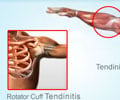Symptoms & Diagnosis
Symptoms are the determinants of the form of treatment you should take. Diagnosis is very important because many times, wrong diagnosis means wrong treatment and worsening of ailment.
There are two most common symptoms of shoulder injury namely, pain and weakness. Pain is not always felt when an injury occurs, however most of the times when experienced, it is a very vague pain which can be hard to pinpoint.
Weakness, on the other hand, is the most reliable symptom with common complaints including inability to raise your arm above head or extend your arm at your back or to the side or in front. The larger the tear to the tendons, the harder it is to move your arm and the injured area.
Symptoms of rotator cuff tears:
- Sudden feeling of tear in the shoulder, followed by severe pain throughout the arm
- Limited movement of the shoulder due to spasm
- Tenderness over the point of rupture
- In case of a severe tear, you will not be able to raise your arm out to the side without assistance.
- You may have pain during the night and trouble sleeping
- Weakness experienced in shoulder movements
- Popping or clicking sound of the shoulder
- Shoulder stiffness at later stages if left untreated
- Feeling of loseness is a sensation of the shoulder coming out of socket
- Immediate pain in your shoulder
- Weakness when lifting or rotating your arm
- Limited range of motion and inability to raise your arm because of pain or weakness
- A crackling sound in the shoulder when it is moved
- Possibly, bruising in your shoulder or upper arm
When To Call a Doctor:
- The pain persists for more than 2-3 days
- You are unable to work due to the pain/limitations
- You are unable to reach up or to the side with the affected arm after 2-3 days
- You are unable to move the shoulder and arm at all
- For any acute injury where you are unable to move the injured shoulder as well as the uninjured shoulder
- Shoulder pain and weakness may be part of symptoms that indicate a much more serious problem, such as a heart attack. In such cases, shoulder pain or weakness occurs with chest pain, shortness of breath, sweating, or nausea
- You have signs of damage to the nerves or blood vessels, such as numbness, tingling, a "pins-and-needles" sensation below the injury, or pale, cold, or bluish skin
To diagnose a rotator cuff disorder, doctors ask about your past medical history relating to the shoulder injuries or shoulder pain. They also do a physical examination to see how well the shoulder moves and if the movements are restricted. Moving the arm in certain ways helps a doctor learn about the cause of pain. It may be difficult to differentiate among the various causes of shoulder pain. A careful evaluation of the presenting history and physical examination is therefore very very important. Several types of advanced imaging techniques, such as MRI arthrography and ultrasonography, may be performed if physical examination is not sufficient to rule out the cause.









